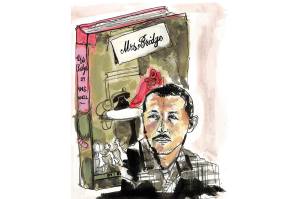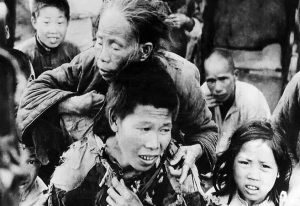When my siblings and I were clearing out my dad’s bookshelves (he died earlier this year), I made sure to keep any books in which I’d written a personal dedication to him. For some reason I baulked at the idea of them passing into the hands of strangers, or just being left to languish in the anonymous corners of charity bookshops. Worse than that would have been copies of my own novels, dedicated on the title page to ‘Dad’. (‘So even his own father didn’t bother keeping them…’)
Why do we write dedications in books? I understand it as a romantic gesture: a way to show off your tremendous good taste to someone you fancy. But as for ordinary occasional presents, the custom is slightly mysterious; it’s not as if many of us wrote messages on CDs or, earlier, LPs. I tended to include dedications in books more often in my younger years. Experience has taught me to hold back. There is one particular howler that I can hardly bear to look at. It’s a hardback copy of Flaubert’s Parrot by Julian Barnes, which I gave as a Christmas present to my mother. It reads: ‘Christmas 1984. To Mum, With Fond Regards, Tony.’ Fond regards!? What kind of faux-Edwardian toss is that from a loving son? I don’t recall Mum ever mentioning it, possibly out of embarrassment.
Scrolling through used-book websites it’s interesting to see how booksellers will drily note in the contents box ‘inscription on flyleaf’, as if that were a drawback, like ‘fading on spine’. But in fact the presence of a personal inscription would make me more likely to buy it, not less. I cherish certain books of mine simply for their dedications. Some are laconic, like ‘To Moss from Pig [or is it Rig?] Christmas 1963’ inside Cyril Connolly’s Previous Convictions. Or ‘To Beals from Posey 1962’ on the flyleaf of Geoffrey Fletcher’s The London Nobody Knows, which the book’s subsequent owner has drawn a box around, as if to fence off the dedication into irrelevance. I then added my own name there on a William Nicholson bookplate, a habit I indulged some years ago in the hope that, when my library is eventually dispersed, someone might pick it up and wonder who ‘Anthony Quinn’ was. I have since desisted. ‘Such attics cleared of me! Such absences!’, as Larkin reflected.
Sometimes the dedication is so involved you can sense the story in the background. In my copy of Tom Wolfe’s The Right Stuff, half a page is taken up with this little challenge: ‘Jeff — in spite of our efforts to educate you into the “real navy” (aviation that is) and our abysmal failure I’ll bet you can find yourself in here — won’t tell you which one we think you are — you can sort it out for yourself. Denis and Barbara. P.S. Sheila — no doubt about you: you’re the nice lady.’ I wonder if Jeff ever did work out which character he was supposed to resemble; it clearly didn’t intrigue him enough to keep the book.
In Hay-on-Wye I bought a first edition of John Updike’s A Month of Sundays with this handwritten dedication from the author: ‘For Sandra Clark with every good wish, this delightful book — John Updike 6/12/89.’ Delightful, eh? Uncharacteristic immodesty from the great man. Busy and prolific as he was, Updike can be forgiven: he probably signed so many in his life he didn’t even notice the slip. Or perhaps he was only quoting Sandra, the dedicatee, who approached him at the festival and asked him to sign what she considered his ‘delightful’ book?
Authors wishing to make a gift of their work to friends used to send what were known as ‘presentation copies’. The only truly valuable book I own is an original edition of Sleeping Fires by George Gissing, his 1895 novel, with a dedication in the author’s hand to his old friend Clara Collet. ‘Miss C. Collet from G.G. Dec. 1895.’ That’s it, not even a ‘fond regards’. The Victorian way.
There’s always a chance, of course, that the lovingly inscribed copy may come back to bite you. When Paul Theroux one day received in the post a catalog of modern first editions he was astonished to find listed there copies of his own books for sale, several of them inscribed to Vidia Naipaul, his friend of 30 years. Two of them were priced at $1,500 apiece. Bemused, Theroux faxed Naipaul the bookseller’s catalog pages and asked: ‘How are you?’ A reply came, not from Naipaul but from his second wife, Nadira, furiously upbraiding him for the obituary he had written of Naipaul’s recently deceased first wife, Pat. A further silence ensued, and relations between the two men began to unravel.
In her wonderful volume of essays Ex Libris, Anne Fadiman considers the dangers of letting go of one’s inscribed copies, with their evidence of betrayed friendship. She quotes the story of Shaw happening upon one of his books in a secondhand shop, bearing the dedication ‘To ———, with esteem, George Bernard Shaw’. He bought the book and returned it to ———, adding the line, ‘With renewed esteem, George Bernard Shaw’.
I have a favorite from my own shelves. A few years ago I was lucky enough to be at a dinner with James Salter, the great American novelist who was just then enjoying a late renaissance of interest. I had brought along a cherished copy of his 1990 book Dusk and Other Stories to be signed. At the end of the evening I handed it to Salter, who examined it, baffled, as if he’d never seen the book before. In fact he never had seen it before; I had forgotten that the book had been withdrawn by the publishers (there may have been an issue with the jacket cover). He wrote: ‘To Anthony, This inexplicable edition, Best wishes, James Salter 3/20/07.’ So I not only had an inscribed Salter but one of authorized rarity value.
I still scour secondhand bookshops, on the lookout for these ghostly remnants of love and friendship and loss, especially in goodwill shops where the libraries of the deceased so often wind up. A couple of weeks ago I found at Islington Oxfam a copy of Wise Children by Angela Carter, with this written on the flyleaf:
‘5th March 1992.
To our lovely Mum
Happy Birthday and lots of love
From your two wise daughters
Polly & Virginia.’
I showed this to the lady at the till when I paid for it. She nodded and looked at me. ‘It’s sad, isn’t it?’
This article is in The Spectator’s November 2019 US edition.


















